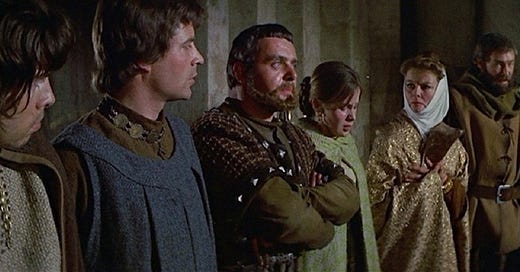More movies everyone’s seen but me!
The Lion in Winter (1968)
A chronicle of the most awkward family gathering in history, The Lion in Winter takes place on Christmas Eve 1168. Henry II has sprung his wife, Eleanor of Aquitaine, from house arrest for the holiday – and to settle the question of who will be the next king of England. The heir, Young Henry, has died, leaving his three brothers as candidates for the throne: Richard, a military genius who’s also a murderous hothead; Geoffrey, an able schemer seen as better suited to pulling puppet strings; and John, who has no redeeming qualities whatsoever. Complicating matters is the presence of another king, Philip II of France. Philip’s sister, Alais, will become the next king’s queen, but Henry has taken her for his mistress.
The cast is wonderful – Peter O’Toole raves and rants as Henry, matched every step of the way by Katherine Hepburn as Eleanor. Anthony Hopkins’ turn as Richard made him a star, and then-newcomer Timothy Dalton is a wonderfully sleek and sinister Philip. Hopkins and Dalton are particularly good in a scene that makes no bones about Richard and Philip having been lovers, constructed as a bit of subtle escalation in a movie that doesn’t work overtime at being subtle. Nigel Terry, who’d play a nobler king in Excalibur, does the best he can with the one-note role of John, and John Castle is properly cool and calculating as Geoffrey.
(Historical spoiler: Geoffrey strikes the audience as probably best suited for kingship, but in reality was the only one of the brothers never to rule.)
The funny thing about The Lion in Winter is that it’s lavishly praised for highbrow reasons: that cast, the oh-so-literate script, the costumes, the locations. All of which is true, but this is essentially a soap opera. Everyone is screaming at everyone all the time, alliances are made and broken and remade multiple times per scene, and the emo gets cranked to 11 in the first scene and left there.
I was stunned to find a contemporary review by the great Roger Ebert that compared Lion with A Man For All Seasons and settled on Lion as the better film. To me, Man is a masterpiece, a moving meditation on power, morality and the cost of sticking to one’s beliefs, while Lion is big-budget camp – Dallas with swords, essentially. There’s nothing wrong with that whatsoever, and that carnivorous Hepburn performance will stick with me, but I can’t seriously compare the two.
The Private Lives of Elizabeth and Essex (1939)
Bette Davis is a hoot as Elizabeth, at least until her twitching starts to dominate her performance. But then there’s Errol Flynn, whose range covers the gamut from “smug” to “mildly vexed,” and whose chemistry with Davis could be kindly described as nonexistent. My eyes were rolling out of my head by the end, when Elizabeth waits out Essex’s execution in an auxiliary throne room in the Tower of London, reached by an apparently weightless staircase that opens and closes itself like a big foam pocket knife. The rest of the movie is only slightly less ludicrous – at first in a good way, but rather quickly not so much.
Camille (1936)
Apparently it was camp week at the Fry house. Greta Garbo plays Marguerite, a Paris courtesan who’s always spectacularly in debt. Her procuress arranges a meeting between Marguerite and the Baron de Varville, except she catches the eye of Armand Duval, whose family fortune is modest. Complications ensue; tragedy awaits.
Garbo is radiant as Marguerite, and the dialogue is snappy fun, particularly when the various courtesans are trading barbs and jockeying for position. Henry Daniell is an elegantly amoral de Varville, while Robert Taylor is beautiful and wooden, which sounds like a criticism but is actually perfect for Armand.
Maybe this is the right place to discuss something I’ve found frustrating about my attempt to educate myself about movies. How much should you be expected to know about the context of a film before seeing it?
For example, I suspect Camille is beloved because it’s seen as Garbo’s manifesto, a stubborn declaration of independence that foreshadows her retirement from movies a few years later and the decades of carefully guarded privacy that followed. Which is all interesting, and something I vaguely knew going into the film. But if you see Camille without that context, you’ll probably conclude it’s pretty lightweight fare. And I’m not sure that’s the wrong conclusion.



